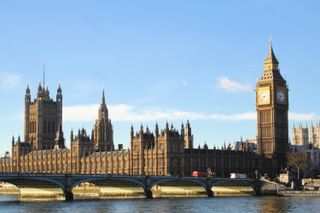Push for UK elections to include online votes by 2020
The Speaker's Commission on Digital Democracy wants to transform Parliament into a digital-friendly institution

People should be able to vote online by 2020, according to a commission tasked with giving Parliament a digital facelift.
The target set by the Speaker's Commission on Digital Democracy was published today as part of a raft of recommendations designed to transform the way people engage with politics.
House of Commons speaker John Bercow said Parliament must overcome security concerns to ensure people can vote online and to make politics more open and relevant to young voters.
Speaking in London this morning, he said: "It's becoming increasingly more difficult to persuade younger voters to vote using traditional methods. There is an urgent need to investigate the means by which citizens can be given access to online voting.
"We recommend online voting should be an option for citizens, providing of course the inevitable concerns of security can be overcome."
Security
Those fears include factors like ensuring someone is who they say they are online and the necessity of parting with personal details in order to register.
Get the ITPro. daily newsletter
Receive our latest news, industry updates, featured resources and more. Sign up today to receive our FREE report on AI cyber crime & security - newly updated for 2024.
However, the commission said current government IT projects like Gov.uk Verify could help secure the process of online voting.
The Verify scheme is being trialled by HMRC and was introduced by the Government Digital Service (GDS), Whitehall's digital arm, to help confirm people's identities online.
And Helen Milner, commission member and chief executive of social enterprise the Tinder Foundation, confirmed to IT Pro that Verify is an option to add security to online voting.
"Obviously GDS think [Verify is] a way in which people who are giving a lot of data can do so in a very user-friendly way," she added. "It's got to be safe, of course, [and] it's got to be done properly, but countries are doing online voting and we've got to learn from them."
Pilot projects
While the report is seen as a roadmap, rather than a guide on how the projects will be advanced, commission member Femi Oyeniran told IT Pro that online voting could be trialled initially by small groups who may currently only be able to cast their vote via post.
"It starts off being tested on a specific group of people," he said. "Maybe disabled people, maybe soldiers at war. There's an option [to use a] small group and see how it goes, use those as test cases."
Milner said the online voting option could be part of a wider suite of digital tools giving young voters better access to information on their incumbent MP, local candidates and more.
"People who do turn up at the voting booth quite often don't have that much information, they have to work really hard to go and find it," she added.
The Speaker's Commission on Digital Democracy proposed a range of other measures to improve voter engagement in its report, titled 'Open Up!'.
One recommends ending a restriction on members of the public using mobile phones and tablets in the House of Commons, even suggesting the House tries out live social media coverage of debates.
Absent MPs could also cast their votes electronically if they cannot make a debate for personal reasons.
The commission also wants to see Hansard records of Parliament sessions opened up as a publically-accessible dataset by the end of 2015.
Bercow said: "There is an army of developers and geeks, if I may be so bold as to call them that, who would like nothing better than to be able to take the raw data used by Parliament and easily convert it into apps, websites and alerts to keep the public informed."
This chimes with the open data initiatives of central government, and Milner told IT Pro that this is a technical challenge, rather than a cultural one.
"Parliament is absolutely committed to making itself transparent and accountable and it wants that data to be out there," she said.
"The way in which the data is created and produced and made available is a bit clunky and isn't terribly modern at the moment."
The success of the commission's proposals will have much to do with how much suppport they get from Parliament's first director of the newly-created Parliamentary Digital Service.
Former Royal Opera House CTO, Rob Greig, is to start in the post in March, and will command a 6 million technology budget and 300 staff to bring about a technological transformation in Britain's democratic institution.
Another 24 million is available to underpin a new digital strategy for the House of Commons and House of Lords.
Milner said the new service should work more closely with the GDS to achieve some of the goals, but that Parliament will take the lead.
"Obviously sorting out the digital needs of Parliament is different to the digital needs of government departments and citizens," she said.
"Where there's overlap I think they will work closer together but I think it's important to understand that Parliament has its own needs."




